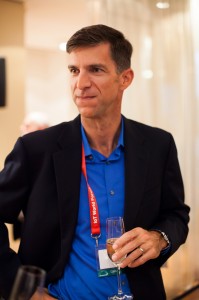
Photo: Cisco
Apps can help cities create new revenue
29 October 2013
by Richard Forster
Cities need to grasp new app technology to not only help improve the public good but also to earn valuable new revenue, 800 guests heard today at Cisco’s inaugural Internet of Things World Forum in Barcelona.
Speaking during the afternoon keynote session, Rod Soderbery, Senior Vice President, Enterprise Networking Group, Cisco, told the ‘invite-only’ audience that from new parking apps alone, cities can increase revenue by 20 to 30 percent and also reduce urban traffic by 30 percent.
Soderbery recalled that when he went to watch a baseball game in San Francisco to his surprise there was a parking space right in front of the stadium. “I was shocked to then find out that the street parking was US$11 an hour,” he explained. “But these new apps enable users to enter how far they want to walk and how much they are willing to pay. San Francisco got US$44 from me but I was happy as I got to the game and met my client.”
According to Cisco research, the Internet of Everything–defined as the intelligent connection of people, processes, data and things–is predicted to create business opportunities of up to US$14.4 trillion in private sector economic ‘value at stake’ over the next 10 years. As well as city leaders key companies keen to further tap into the market like Schneider Electric, AGT International, Bosch and Alstom participated in the sessions with many showcasing their technologies in the exhibition hall.
Delegates heard how improving existing infrastructure with technology is another way for cities to become smarter without re-building from scratch. In the US the introduction of Positive Train Control technology, that monitors and controls train movements to provide increased safety, has led to other benefits.

“Just by knowing where trains are we can use that to drive better performance,” added Soderbery. “This means 1-2 percent savings in fuel and has also enabled passenger capacity to be doubled.”
Berlin, together with Nice and Chicago, reinforced the importance of not only improving existing city infrastructure but also recycling it, during a breakout session that followed covering the opportunity of the ‘internet of things’ across the public sector.
Tegel airport in Berlin is to be converted into a research and industrial park where urban technologies will be designed, produced and exported.
“We need to get more done with less,” said Dr Philipp Bouteilier, CEO, Berlin TXL The Urban Tech Republic. “We need to use the existing infrastructure to get more out of it. At the moment it is still an airport – the planning stage is very important – but we are not there yet. Most cities don’t have the infrastructure to be a smart city yet or a smart city strategy. In Berlin we are in the process of doing this.”
To help cities and companies fill the ever increasing demand for ICT related jobs, Cisco later announced a global commitment to educate and empower current and future generations of Internet of Things (IoT) entrepreneurs, scientists and innovators. A new partnership with the New York Academy of Sciences will establish the Global STEM Alliance to effectively link the New York Academy of Sciences’ successful local programmes to locations around the world through in-person and online platforms. Barcelona announced that it will be the first city to join.
“The Internet of Things is a reality today and will only continue to create unprecedented opportunities,” said Wim Elfrink, Executive Vice President Industry Solutions & Chief Globalisation Officer at Cisco. “Empowering and preparing the next generation workforce to take part in this global opportunity is a critical piece of fueling IoT innovation. “











